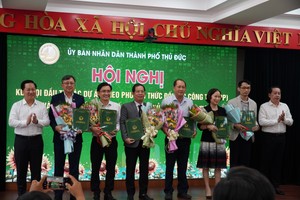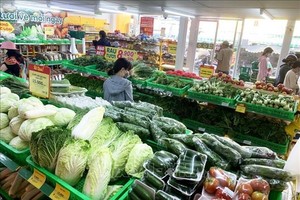 Paddy is loaded onto boats to transport to warehouses in the Mekong Delta. (Photo: SGGP)
Paddy is loaded onto boats to transport to warehouses in the Mekong Delta. (Photo: SGGP)
The office of the Ministry of Industry and Trade (MoIT), on the afternoon of August 16, informed that its leader had signed an official dispatch to the Prime Minister, reporting on the consumption of paddy and commodity rice in the context of the Covid-19 pandemic in the South.
According to the report, in the first seven months of this year, although the average export price rose by US$53.5 per ton, compared to the same period last year, the value of Vietnamese rice export turnover dropped by 3.1 percent because the export volume fell by 12.69 percent.
Although according to this year’s plan, Vietnam will export about 6 million-6.2 million tons of rice of all kinds, worth more than $3.32 trillion, at present, most traders hesitate to sign new export contracts because of congestion in circulation, receipt, and delivery at seaports. The difference between the price at the time of offering and the actual freight at the time of delivery is too large, putting both traders and customers at great risk.
If this situation keeps going, it will affect export turnover and pose a risk of losing traditional markets, such as the Philippines, China, and Malaysia to other competitors in the region, namely Thailand and India, the official dispatch of the MoIT stated.
Due to difficulties in the export of rice, rice prices have plummeted. To ensure timely consumption of paddy and commodity rice for farmers, based on the meeting with the Vietnam Food Association, the MoIT proposed and recommended that the Prime Minister assign ministries, sectors, and localities to deploy the group of urgent solutions, including urgently researching to open green channels for waterway transport and creating favorable conditions for enterprises to access capital to purchase paddy and commodity rice.
Regarding the opening of green channels for water transport, the MoIT said that with the terrain of interlaced canals' characteristics, most rice processing factories are located near the riverbanks and canals, so 95 percent of the paddy produced in the Mekong Delta are transported by waterway. Therefore, it will contribute significantly to helping rice exporters maintain the supply chain of paddy and commodity rice from the field to the export port.
Therefore, the MoIT proposed the Prime Minister to assign the Ministry of Transport to lead and coordinate with the Ministry of Health, relevant ministries, sectors, and localities to soon develop and report plans on the green channel for waterway transport, ensuring the requirements of Covid-19 pandemic prevention but soothing the current congestion; assign the People's Committees of provinces and cities in the Mekong Delta to urgently create the most favorable conditions possible for rice traders to travel and purchase paddy directly at fields, discuss and unify with the Ministry of Health and the Ministry of Transport to consider and apply flexibly the two following solutions:
Option 1: Accepting rapid test results in hamlets and communes; registering information and travel schedules with State management agencies in hamlets and communes, and applying the same to the force of stevedores. Especially, considering giving priority to green channeling (carrying out rapid testing at quarantine checkpoints on the river) for vehicles transporting fresh rice from the field to the nearest satellite drying plants to ensure the required quality of stockpiled paddy.
As for the transportation of paddy and rice between factories not located in the same province or from factories to export ports or areas for domestic consumption, quarantine checkpoints on large rivers at bordering locations should have a nearby accompanying testing facility to meet the testing needs for steersmen during long-haul intercity transportation.
Option 2: In case businesses agreed to provide rapid test kits for the checkpoints on the river, when their boats and barges move through these checkpoints, these checkpoints are asked to conduct quick tests and approve the pass for vehicles to move forward.
With this option, local leaders are suggested to flexibly direct the request for a certificate of a negative result for Covid-19 (PCR) only when the water vehicle departs the wharf. During its movement on the river, it can use the quick test certificate at the checkpoints to pass through the next checkpoints and the last stop of the route.
According to the report, in the first seven months of this year, although the average export price rose by US$53.5 per ton, compared to the same period last year, the value of Vietnamese rice export turnover dropped by 3.1 percent because the export volume fell by 12.69 percent.
Although according to this year’s plan, Vietnam will export about 6 million-6.2 million tons of rice of all kinds, worth more than $3.32 trillion, at present, most traders hesitate to sign new export contracts because of congestion in circulation, receipt, and delivery at seaports. The difference between the price at the time of offering and the actual freight at the time of delivery is too large, putting both traders and customers at great risk.
If this situation keeps going, it will affect export turnover and pose a risk of losing traditional markets, such as the Philippines, China, and Malaysia to other competitors in the region, namely Thailand and India, the official dispatch of the MoIT stated.
Due to difficulties in the export of rice, rice prices have plummeted. To ensure timely consumption of paddy and commodity rice for farmers, based on the meeting with the Vietnam Food Association, the MoIT proposed and recommended that the Prime Minister assign ministries, sectors, and localities to deploy the group of urgent solutions, including urgently researching to open green channels for waterway transport and creating favorable conditions for enterprises to access capital to purchase paddy and commodity rice.
Regarding the opening of green channels for water transport, the MoIT said that with the terrain of interlaced canals' characteristics, most rice processing factories are located near the riverbanks and canals, so 95 percent of the paddy produced in the Mekong Delta are transported by waterway. Therefore, it will contribute significantly to helping rice exporters maintain the supply chain of paddy and commodity rice from the field to the export port.
Therefore, the MoIT proposed the Prime Minister to assign the Ministry of Transport to lead and coordinate with the Ministry of Health, relevant ministries, sectors, and localities to soon develop and report plans on the green channel for waterway transport, ensuring the requirements of Covid-19 pandemic prevention but soothing the current congestion; assign the People's Committees of provinces and cities in the Mekong Delta to urgently create the most favorable conditions possible for rice traders to travel and purchase paddy directly at fields, discuss and unify with the Ministry of Health and the Ministry of Transport to consider and apply flexibly the two following solutions:
Option 1: Accepting rapid test results in hamlets and communes; registering information and travel schedules with State management agencies in hamlets and communes, and applying the same to the force of stevedores. Especially, considering giving priority to green channeling (carrying out rapid testing at quarantine checkpoints on the river) for vehicles transporting fresh rice from the field to the nearest satellite drying plants to ensure the required quality of stockpiled paddy.
As for the transportation of paddy and rice between factories not located in the same province or from factories to export ports or areas for domestic consumption, quarantine checkpoints on large rivers at bordering locations should have a nearby accompanying testing facility to meet the testing needs for steersmen during long-haul intercity transportation.
Option 2: In case businesses agreed to provide rapid test kits for the checkpoints on the river, when their boats and barges move through these checkpoints, these checkpoints are asked to conduct quick tests and approve the pass for vehicles to move forward.
With this option, local leaders are suggested to flexibly direct the request for a certificate of a negative result for Covid-19 (PCR) only when the water vehicle departs the wharf. During its movement on the river, it can use the quick test certificate at the checkpoints to pass through the next checkpoints and the last stop of the route.
The MoIT also proposed to assign the Ministry of Transport to work with the Saigon Newport Corporation to reopen all rice stuffing berths as soon as possible to relieve the congestion of rice containers and consider surcharges to facilitate rice exports in the context of the Covid-19 pandemic, because this port is one of the main ports specializing in packing rice by containers. Shipping lines and logistics enterprises are required to publicize and ensure transparency about container shipping rates and adjust freight rates to a reasonable level.
























